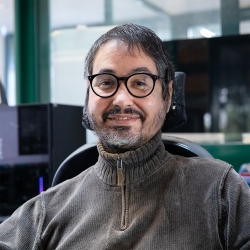Antonio J. Pérez Pulido, PhD
Andalusian Center for Developmental Biology (CABD) and Pablo de Olavide University.

Antonio J. Pérez Pulido holds a degree in Biology from the University of Jaén and a PhD in Bioinformatics from the University of Málaga. He completed his postdoctoral studies at the National Institute of Bioinformatics, and since 2007 he has been a professor at Pablo de Olavide University and a researcher at the Andalusian Center for Developmental Biology, where he leads a computational biology group. Since his thesis, he has specialized in the development of computational tools for the functional annotation of proteins, and since 2017 he has specialized in the analysis of bacterial pangenomes, with a special interest in CRISPR-Cas systems and other phage defense systems.
Title of the presentation: AI applied to pangenomics to explore the constant war between viruses and bacteria
Abstract: Bacteriophages (bacterial viruses or phages) exist in a ratio of 1 to 10 with respect to bacteria, and it is estimated that they eliminate up to half of these bacteria daily in different natural environments. Bacteria, in turn, defend themselves using different biological weapons, of which there are currently more than a hundred known types.
Our group constructs and analyses bacterial pangenomes using thousands of public genomes of clinically relevant bacteria. These pangenomes are translated into binary matrices of gene presence-absence, with tens of thousands for each, to which information about phages, their receptors (proteins they use to enter the bacterium) and the defence and anti-defence systems of both are added. Finally, we apply machine learning techniques such as random forest with XGBoost and CN2 rule induction as tree-based algorithms, along with other standard data mining methods, to identify marker genes related to the characteristics of interest.
In this way, we have been able to establish relationships between bacterial adaptive immunity defence systems, CRISPR-Cas, and phages of different species, as well as find specific defence systems of groups of bacteria of great clinical concern. These results are useful for better understanding the genomic plasticity of this bacterium and could be used in phage therapy, the alternative to antibiotics that is becoming increasingly important.
Juan Mora Delgado, PhD
Specialist Physician in Internal Medicine. Internal Medicine and Palliative Care Clinical Unit. University Hospital of Jerez de la Frontera.

Juan Mora Delgado is a specialist in Internal Medicine and holds a PhD in Health Sciences. He combines his clinical work with research and training in artificial intelligence applied to health. He has created more than 50 AI co-pilots for clinical research, founded ‘La MembresIA’ (a micro-training community in AI for healthcare professionals), and is the author of the program ‘Antiexperto en IA en Salud’ (Anti-expert in AI in Health). With more than 15,000 followers on LinkedIn, he promotes the digital transformation of healthcare and biomedical professionals through research, clinical practice, and collaboration with the pharmaceutical industry.
Presentation title: If you research like it’s 2010, AI will write your scientific obituary
Summary: Artificial intelligence is not here to replace researchers, but to free them from what takes up most of their time: endless searches, statistical tables, methodological reviews, and impossible journal formats. In this experience, we will take a practical tour of AI co-pilots created specifically for biomedical research: from generating research questions and advanced bibliographic searches to calculating sample size, scientific writing, and preparing articles for high-impact journals. The goal is to show, with real examples requested by the live audience, how any healthcare or biomedical professional can shorten years of research work and focus on the essentials: science and patients.
